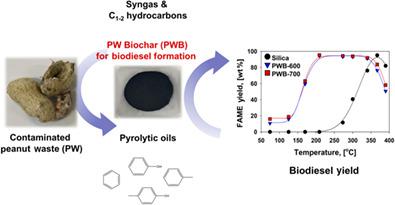当前位置:
X-MOL 学术
›
Int. J. Energy Res.
›
论文详情
Our official English website, www.x-mol.net, welcomes your
feedback! (Note: you will need to create a separate account there.)
Valorization of peanut wastes into a catalyst in production of biodiesel
International Journal of Energy Research ( IF 4.3 ) Pub Date : 2021-09-06 , DOI: 10.1002/er.7248 Minyoung Kim, Dong-Jun Lee, Sungyup Jung, Scott X. Chang, Kun-Yi Andrew Lin, Amit Bhatnagar, Eilhann E. Kwon, Yiu Fai Tsang
International Journal of Energy Research ( IF 4.3 ) Pub Date : 2021-09-06 , DOI: 10.1002/er.7248 Minyoung Kim, Dong-Jun Lee, Sungyup Jung, Scott X. Chang, Kun-Yi Andrew Lin, Amit Bhatnagar, Eilhann E. Kwon, Yiu Fai Tsang

|
To offer an innovative way to valorize industrial crop waste into the diverse types of biofuels, the thermochemical process of peanut waste (PW) was investigated. In particular, this study laid a great stress on the use of PW-derived biochar as a cheap catalytic material in the production of biodiesel. Specifically, biochar derived from the pyrolysis of PW was used as a catalytic and porous medium for biodiesel production to enhance reaction kinetics and lower reaction temperature, compared to conventional methods. Two PW-derived biochars produced at 600°C (PWB-600) and 700°C (PWB-700) were effective on the transesterification of soybean oil, showing higher than 95 wt% of biodiesel yield after 1 minute of transesterification reaction at ≥210°C. As a comparison, a commercially used reaction, alkali-catalyzed transesterification, was conducted at 60°C with a KOH catalyst. Biodiesel yield from the alkali-catalyzed reaction was less than 90 wt% even after 6 hours of reaction. Given that the biochar formation process results in the generation of pyrolytic gases and oils, both pyrolysates at different temperatures were also monitored. Pyrolytic gases included syngas and C1-2 hydrocarbons, whereas pyrolytic oils consisted of phenolic compounds that can be used as intermediates for the synthesis of value-added chemicals. Thus, the results confirmed that the thermochemical upgrading of PW produces value-added industrial chemicals (pyrolytic gases and oils) and biochars that are highly active for the biodiesel production process.
中文翻译:

将花生废料增值为生物柴油生产的催化剂
为了提供一种将工业作物废物转化为不同类型生物燃料的创新方法,研究了花生废物 (PW) 的热化学过程。特别是,本研究重点强调了使用 PW 衍生的生物炭作为一种廉价的催化材料生产生物柴油。具体而言,与传统方法相比,PW 热解产生的生物炭被用作生物柴油生产的催化和多孔介质,以增强反应动力学并降低反应温度。在 600°C (PWB-600) 和 700°C (PWB-700) 生产的两种 PW 衍生生物炭对大豆油的酯交换反应有效,在≥ 210℃。作为比较,商业上使用的反应,碱催化酯交换,用 KOH 催化剂在 60°C 下进行。即使在反应 6 小时后,来自碱催化反应的生物柴油产率也低于 90 wt%。鉴于生物炭形成过程会产生热解气体和油,因此还监测了不同温度下的两种热解物。热解气体包括合成气和 C1-2碳氢化合物,而热解油由酚类化合物组成,可用作合成增值化学品的中间体。因此,结果证实,PW 的热化学升级产生了对生物柴油生产过程具有高度活性的增值工业化学品(热解气体和油)和生物炭。
更新日期:2021-09-06
中文翻译:

将花生废料增值为生物柴油生产的催化剂
为了提供一种将工业作物废物转化为不同类型生物燃料的创新方法,研究了花生废物 (PW) 的热化学过程。特别是,本研究重点强调了使用 PW 衍生的生物炭作为一种廉价的催化材料生产生物柴油。具体而言,与传统方法相比,PW 热解产生的生物炭被用作生物柴油生产的催化和多孔介质,以增强反应动力学并降低反应温度。在 600°C (PWB-600) 和 700°C (PWB-700) 生产的两种 PW 衍生生物炭对大豆油的酯交换反应有效,在≥ 210℃。作为比较,商业上使用的反应,碱催化酯交换,用 KOH 催化剂在 60°C 下进行。即使在反应 6 小时后,来自碱催化反应的生物柴油产率也低于 90 wt%。鉴于生物炭形成过程会产生热解气体和油,因此还监测了不同温度下的两种热解物。热解气体包括合成气和 C1-2碳氢化合物,而热解油由酚类化合物组成,可用作合成增值化学品的中间体。因此,结果证实,PW 的热化学升级产生了对生物柴油生产过程具有高度活性的增值工业化学品(热解气体和油)和生物炭。











































 京公网安备 11010802027423号
京公网安备 11010802027423号